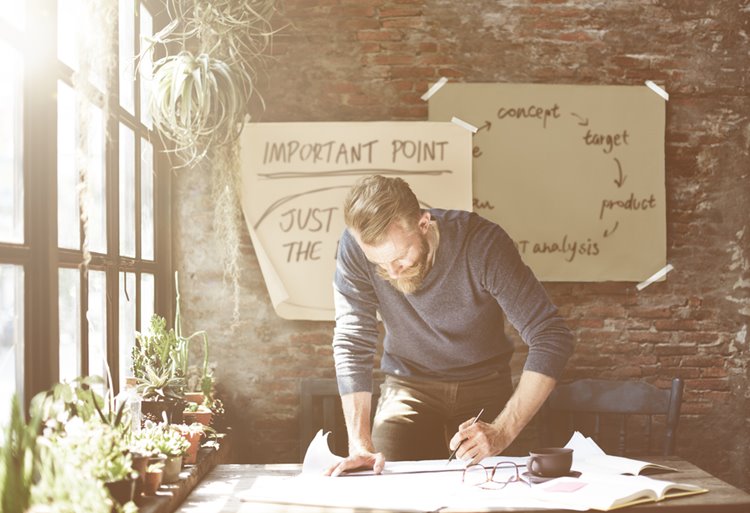3 productivity tips to help you make the most of your time

Ever started a day of work or study full of the promise and watched it disappear magically in a blur of procrastination? Help is on the way, with a list of tools, apps and a bit of productivity inspiration from some of the world’s most productive people.
As Skillstalk eagerly absorbed all the productivity literature we could get our hands on, we noticed there were three clear themes running through most advice posts. Each of these habits were mentioned time and time again. The masters and mistresses of these habits were running multibillion dollar organisations.
And if they can harness the power of three, then why can’t you? So here they are.
To be productive you should:

- Rise early
- Exercise
- Focus on one thing at a time
That’s it. It sounds just like what everyone’s mother has been shouting at them for years doesn’t it? So at the risk of sounding like a broken record, let's break these productivity tips down.
Amazing productivity hack 1: Get up early
This is such a popular recommendation for improving productivity there’s even an article on famous executives who do so called, Twenty-seven executives who wake up really early. Many of them loved the quiet of the early morning, citing lack of distractions, time to read, early access to world news or overseas markets as reasons for rising at the crack. Some were natural early risers, and others had trained themselves to do so.
My conclusion? Whether you are a committed night owl or a determined lark, your productivity will increase if you rise earlier.
Amazing productivity hack 2: Exercise regularly
At least half the executives mentioned above rose early to exercise or meditate (or both). Keeping the body fit, in the eyes of the ultra-successful and uber productive, is key to keeping the mind focused on the tasks of the busy day ahead.
It probably also helps to counter the effect of all those long executive lunches too. Forbes links exercise and productivity in this article by Jennifer Cohen. There’s plenty of scientific evidence available that proves exercise improves energy, focus and mood.
James Clear and Robin Sharma also both talk about regular exercise as an important part of a productive mindset.
Amazing productivity hack 3: Focus on one thing at a time
Kathleen Davis from Fast Company has compiled 11 expert tips to help you be more productive. The first one on her list is the ability to focus on just one big task, not the minutiae. In her article, she quotes David Rucenko, the CEO of Weebly, who says,"It is all too easy to get distracted by work that takes up a lot of time and energy."
Bruna Martinuzza has a similar recommendation in her piece 12 productivity tips from incredibly busy people on the American Express open forum. Again, it’s tip number 1. Have a single purpose focus, the article states, citing Jason Goldberg, CEO of Fab.com who says, "Pick one thing & do that one thing & only that one thing better than anyone else ever could."
This one is the clincher. You’ll be more productive if you stop being distracted. By phone calls, emails, text messages, Facebook, Twitter, the washing pile, the dog, the sun shining in your window. You have to focus on what need to be done now.
These three habits come up again and again, from interviews with successful people from all countries and all walks of life.
Take heart, night owls and couch dwellers
You may suspect you could represent your country in lazy, couch potato procrastination. But if you’re committed to improving your productivity, there are small ways you can begin to fit these three habits into your daily routine.
Try:
- Setting your alarm 15 minutes early
- Getting up and do some stretches or a quick walk
- When you are working, keep your focus on the task at hand
Now rather than leaving you with these three magical and life changing productivity hacks, I’ve very kindly gone a little further and assembled a few practical tools and tips you can use to help you further in your quest for productivity.
Some are free, some are paid, some are already inside you.
Productivity Tools

These can be used to protect you from yourself, to motivate you to do more, to help you direct your attention and clarify the tasks ahead, in more productive ways than you’re doing right now.
Block distractions
SelfControl App is a program designed to completely block your access to the internet for up to 8 hours, preventing distraction and keeping your focus on the job, instead of cat videos. SelfControl is a free and open-source application for Mac OS X that lets you block your own access to distracting websites, your mail servers, or anything else on the Internet.
Just set a period of time to block for, add sites to your blacklist, and click "Start." Until that timer expires, you will be unable to access those sites--even if you restart your computer or delete the application.
These programs can be used to block particular sites, allowing you to still read and research the Internet without the distractions of social media.
RescueTime tells you how your spend your time online, giving you a report at the end of the day, allowing you to review your productive times, and make changes to your habits. It also allows you to block specific websites.
This one works by surprising you with the cold hard details of how you spend time online. Once you know how much time you actually waste on non-productive activities, you should feel guilty enough to make some changes.
If you are working or studying at home, try to do so in a room where there is no fridge, telephone, dirty dishes or laundry baskets full of washing. The great gods of procrastination will have you eating, chatting and cleaning instead of focusing on your work. Thwart them any way you can.
In his article on time management, James Clear warns about the dangers of doing what he calls half work. He explains that “Half Work” occurs when you’re not totally absorbed by the task at hand. If you’re on the phone and looking at your emails, or keep leaving the article you’re writing to make pithy comments on Twitter, you are only half-working. Stop. Now. Or your productivity will always suffer.
Be realistic about your capabilities and aware of your shortcomings
Know the time of day you’re most productive and use it to attack your most difficult tasks. Wow, it sounds so easy.
This is an excellent theory, yet very difficult to carry out in practice. Life being what it is, you’ll be lucky if you even know when you’re most productive, let alone have that time free to do your best work.
Before you give up in frustration, try keeping track of your work patterns for a few days and note when you are super focused and when you’re vaguing out. Being aware of your strengths and weaknesses is a huge advantage for improving your productivity.
If you know there are times of the day when you are completely useless e.g.. early morning, or after 9pm, then don’t attempt anything serious at these times. Use them to clear routine emails or do repetitive tasks that don’t require much brain power.
Or, if your time comes in chunks, e.g. when the baby is sleeping, break your work down into smaller tasks so you don’t feel overwhelmed.
James Clear also recommends working to your own timetable or schedule, but if time runs short, reduce the scope of the task rather than not doing it at all. This way you still achieve something, and you’re still committed to your schedule. For example, if you planned a 5km run but you don’t have time for it, run 2km rather than not at all.
Apps and ideas to help you
Pomodoro is a widely used productivity technique. It works by focusing your attention in 25 minute blocks. During those 25 minutes, you do nothing but the task at hand. When the alarm signals the end of the 25 minutes, you take a 5-minute break. After four, twenty-five-minute sessions you take a longer break.
Those who love it find it really focuses their attention in those 25 minutes, and helps them to break down tasks to suit the time available. It’s easy to understand and it’s also free.
Getting things done sells itself as a comprehensive plan for productivity, with five steps designed to take you from chaos to an organised life. There’s a slick website, a book to purchase and seminars to attend.
Outsourcing
Look at what you spend your time on. Are you spending hours trying to accomplish tasks you’re really bad at? Try paying an expert to do them for you and get back to what you’re good at.
Consider these:
- Virtual assistant
- Book-keeper
- Cleaner
- Laundry service
To do lists
The simple pen and paper to do list is still the simplest way to keep you on track.
You may require a number of lists. A work list, a study list and a home list depending on how much you spread yourself around. Or you can classify your lists by tasks e.g.. emails to send, phone calls to make etc.
Google calendar and other iPhone and Android apps can be used for reminders. List apps like Wunderlist, TeuxDeux and reminder programs like Remember The Milk, are useful (sometimes quirky) tools you can use to jog your memory.
Cloud Storage
The Cloud is useful because it gives you a central place to store files and allows you to share them with others for easy collaboration. Try Dropbox, iCloud or Google Drive.
The Cloud may not be super secure, so use a suitably difficult password. If you’re not organised you might end up with files in several places, so use folders and filing systems systematically.
Email rules
Another distraction avoider. You can choose to divert emails from particular senders, or with particular subjects to different inboxes for you to attack when you’re ready.
For ongoing inspiration
Follow Life Hacker’s How I Work series for regular inspiration on the work habits of successful entrepreneurs.
Conclusion: Get Productive Today!
 Being productive is possible, perhaps even easy, if you’re willing to make a few changes in your life. Various successful thought leaders have spoken and they agree that productivity is assisted by rising early and making time for exercise.
Being productive is possible, perhaps even easy, if you’re willing to make a few changes in your life. Various successful thought leaders have spoken and they agree that productivity is assisted by rising early and making time for exercise.
The ability to focus solely on the task at hand is perhaps the single most contributing factor to productivity.
There are numerous tools (both free and paid) which can help you organise your life, keep yourself focused and help you stay on track. And finally, don’t be afraid to be productive. We’ll leave you in the capable hands of Seth Godin who says to be productive you should, “Focus on things you do very well and do them with leverage and passion.”
Enhance your productivity by studying flexibly
Upskilled offers one of the most flexible ways to get an online qualification so that your productivity never has to slip. Read more about how to study flexibly online today and check out Upskilled's range of online courses.


)
)

